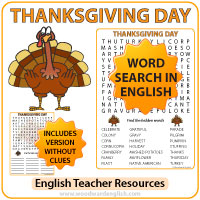Thanksgiving Day
Learn English Vocabulary

Thanksgiving is celebrated on the fourth Thursday of November in United States and the second Monday of October in Canada.
This celebration is to give thanks for all the good things in life.
The first Thanksgiving Day
In 1620, 102 people sailed from England to North America on a small ship called the Mayflower.
These pilgrims, as they have come to be known, set up a colony at Plymouth in present-day Massachusetts. The first winter for the newly-arrived families was very hard as it was difficult to find food and shelter from the cold. Only half of the pilgrims survived. However, when spring arrived, the settlers were taught by the local Wampanoag (Native American) tribe how to cultivate corn, catch fish in the rivers and which poisonous plants to avoid.
After their first corn harvest in 1621, the pilgrims invited their Native American friends to a celebratory banquet as a way of showing gratitude for their help. The festival lasted three days and is considered the first Thanksgiving celebration (though it wasn't called that at the time). This celebration then became an annual event after harvest and spread to other settlements in the area.
Thanksgiving Day in later years
In 1789, George Washington issued the first Thanksgiving proclamation and called upon Americans to express their gratitude for the conclusion to the country's war of independence. In 1817, New York became the first state to officially adopt Thanksgiving as an annual holiday. In 1941 a bill was passed making Thanksgiving the fourth Thursday in November.
Thanksgiving Day Traditions
The following is a list of common Thanksgiving Day traditions in United States.
Family reunion
One of the most important traditions of Thanksgiving day is getting together with the family and having the Thanksgiving meal. More people travel for this day than any other day of the year.
Thanksgiving Meal
No Thanksgiving is complete without having turkey on the dinner table. This is accompanied by cranberry sauce, stuffing, pumpkin pie, mashed potatoes and vegetables.
Parades
There are parades held throughout the country though the most well-known one is the Macy's Parade in New York which lasts around three hours. At the end of the parade Santa Claus appears which announces the start of the Christmas period.
American Football
A popular tradition is to watch a game of NFL Football on TV.
Thanksgiving Day Vocabulary
Here is a list of common things (vocabulary) associated with Thankgiving Day and the meaning of it (or what it is):
- beans: edible seeds, typically kidney-shaped, that grow in long pods.
- colony: an area occupied by settlers from another country
- corn: a North American cereal plant with rows of large yellow kernels on a cob. The local Wampanoag (Native American) tribe showed the pilgrims how to cultivate corn which helped them survive in the New World.
- cornucopia: This is a symbol of abundance and nourishment, commonly a large horn overflowing with produce, flowers or nuts.
- cranberry: a small, red berry. Typically made into a sauce for Thanksgiving.
- dessert: a sweet course eaten at the end of a meal.
- dinner: the main meal of the day.
- fall: (also known as autumn) the season that is between summer and winter. Typically leaves fall from the trees during this season.
- family: a group consisting of parents and children.
- feast: a large meal, typically one in celebration of something.
- football: a form of team game played in United States with an oval ball on a field. There are typically games of football on Thanksgiving Day.
- gratitude: the quality of being thankful; readiness to show appreciation for an act of kindness.
- gravy: the fat and juices exuding from meat during cooking. This is used to cover the meat and vegetables on the plate as a part of the meal. It is normally brown in color.
- harvest: a process or period of gathering or picking crops once they have grown enough to be used later.
- mashed potatoes: a dish of potatoes that have been boiled and mashed into they are smooth.
- Mayflower: The ship that transported the first Pilgrims from Plymouth in England to the New World in 1620.
- Native Americans: a member of any of the indigenous peoples of the Americas.
- November: The 11th month of the year. Thanksgiving is in November in United States
- parade: a public procession that usually celebrates a special day or event.
- pie: a baked dish of fruit, meat or vegetables, typically with a base (and top) of pastry. Pumpkin pie is typical of Thanksgiving.
- pilgrim: a person who goes on a journey for religious reasons.
- pumpkin: a large rounded orange-yellow fruit with a thick rind, edible flesh, and many seeds.
- relatives: a person connected by blood or marriage. Relatives sometimes get together for Thanksgiving.
- settler: a person who decides to live in an area, one that typically has no or few previous inhabitants.
- share: (verb) to have a portion of something with others.
- stuffing: a mixture of bread, onions and herbs used to stuff (or fill) turkey, chicken or other meat before cooking.
- thankful: expressing gratitude and relief; gives thanks for something.
- Thursday: The day of the week between Wednesday and Friday. Thanksgiving day is always celebrated on a Thursday.
- tradition: the transmission of customs or beliefs from generation to generation.
- turkey: a large bird that is native to North America. It is a typical food of Thankgiving and Christmas celebrations.
Next Activity
Try our game about Thanksgiving Day Vocabulary
Resources for Teachers and Parents
If you found this English Vocabulary about Thanksgiving Day interesting or useful, let others know about it.

